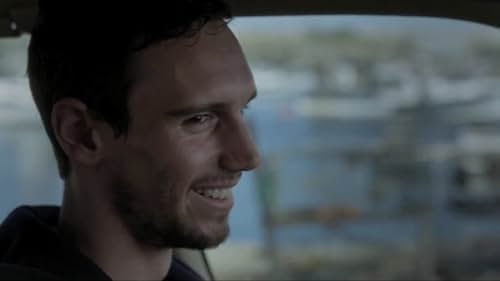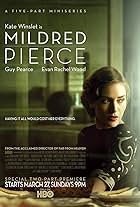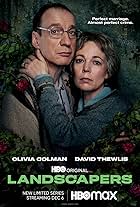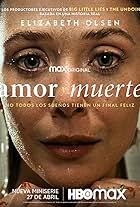Una profesora de matemáticas de secundaria, Olive, y su matrimonio con Henry, que lleva 25 años.Una profesora de matemáticas de secundaria, Olive, y su matrimonio con Henry, que lleva 25 años.Una profesora de matemáticas de secundaria, Olive, y su matrimonio con Henry, que lleva 25 años.
- Ganó 8 premios Primetime Emmy
- 31 premios ganados y 35 nominaciones en total
Los mejor calificados
lun, 3 nov 2014
- T1.E4
- Security
Olive goes to see Christopher and his second wife in New York, but soon returns to Maine, where she receives some bad news about Henry.
8.7/10
Los mejor calificados
lun, 3 nov 2014
- T1.E3
- A Different Road
Christopher comes up with the idea of counseling after Olive and Henry have a scary episode following dinner with friends.
8.5/10
Explorar episodios
Opiniones destacadas
I've just read some of the negative reviews about Olive Ketteridge. I thought it was obvious what we were getting into in the first 30 minutes of this brilliant mini series. Yes it's a bit downbeat. But Olive Ketteridge is about real people and real situations, and let's face it it reflects certain areas of real life. I think we've all known characters like the ones portrayed in Olive Ketteridge. All the performances are spot on. Plus there are many areas of Olive Ketteridge that made this viewer smile. So I don't see the negativity. Maybe the negative reviews come from people who wanted to see a Deloris Claybourne or a True Detctive. Olive Ketteridge is about love, loss and what ifs, and that's about it.. But it's told so well that one almost forgets that the story's so simple.
I love Frances McDormand and Richard Jenkins since I saw them both in Burn after reading. That was when I started to collect (and see) all movies from the Coen brothers, including Fargo, where Frances McDormand was very good. And I always see every movie which has Richard Jenkins as well. But that here was when I realized how incredibly good actors they both are, it just was magic. Like I was spying on some family somehow, you never felt it was just acting. The story was sad, and sometimes embarrassing, but it had wonderful pictures and it was so.... human. I had to keep looking. And in the end there was hope as well. So maybe I should have given more than 8 points, for the acting was definitely 10/10.
You could watch this series along with "Terms Of Endearment" and get a really good dose of dysfunctional family dynamics. And learn something about growing old. And that we're not all that different. You can learn a lot from tough ol' broads. Or you can resent them. The one thing we know is, they will outlive their supposed time on Earth.
The titular character is played pitch perfect by Frances McDormand. Already an old soul when we first seen her in the Coen Brothers movies, she is the epitome of hard as rock stubborn New Englander. Educated by life experiences, her harsh reality is that tragedy has shaped her into a flawed diamond. Indestructible in her set ways, she lives with regret and unknowing to her (but every clear to us) projects her resentment towards the people who actually love her. Unfortunately, in her path is her kind hearted husband Henry Kitteridge (Richard Jenkins), in a stunningly sympathetic and patient man who reaches out to help lost young girls, but does so with the distancing manner of a father. There appears a sexual predator is a foot, but that isn't Henry's nature. He is the town pharmacist who we can see may have had bigger dreams in life, but is content to fulfill his duties to the community. He's seen first as a step rug, then a sounding board, but finally a man. All the parts of which make up a marriage in a small town community dynamic. We could've/would've/should've is pushed so far into the backburner as to cause conflict. And the developments of our youth are shaped by the overwhelming need of parents to control. You will reap what you sow. There wasn't a false moment in this mini-series. It's often painful, a lot of humor, bittersweet moments, tragedy and a lot of moments as I watched the outcome of their history turn to foreshadowed misery that I mutter "Damn that sucks that happened." Not out of pity, but that it is a universal storyline that we all get sickened by.
There are a lot of moments of grimness. In particular, the ease of resolution and mental issues. Even as late as my own generation, mental illness was seen as an embarrassment. People were considered spazzes if they were hyperactive. Or if their parent had drug addiction or drinking problems, they'd be ignored. The kids tend to shrug that off. That's the issue though. Cause life will give us obstacles in the form of relatives or spawn. We are owed nothing, but seem to carry on this notion we're suppose to be living someone else's life. We suppress our needs, if we genuinely care about people. Lost are the times when we hold back, now is the time when people often give up too soon. Is Olive's decision to power through life unhappy the right course for you? Probably not. But it's something to be admired. This mini-series is amazing.
The titular character is played pitch perfect by Frances McDormand. Already an old soul when we first seen her in the Coen Brothers movies, she is the epitome of hard as rock stubborn New Englander. Educated by life experiences, her harsh reality is that tragedy has shaped her into a flawed diamond. Indestructible in her set ways, she lives with regret and unknowing to her (but every clear to us) projects her resentment towards the people who actually love her. Unfortunately, in her path is her kind hearted husband Henry Kitteridge (Richard Jenkins), in a stunningly sympathetic and patient man who reaches out to help lost young girls, but does so with the distancing manner of a father. There appears a sexual predator is a foot, but that isn't Henry's nature. He is the town pharmacist who we can see may have had bigger dreams in life, but is content to fulfill his duties to the community. He's seen first as a step rug, then a sounding board, but finally a man. All the parts of which make up a marriage in a small town community dynamic. We could've/would've/should've is pushed so far into the backburner as to cause conflict. And the developments of our youth are shaped by the overwhelming need of parents to control. You will reap what you sow. There wasn't a false moment in this mini-series. It's often painful, a lot of humor, bittersweet moments, tragedy and a lot of moments as I watched the outcome of their history turn to foreshadowed misery that I mutter "Damn that sucks that happened." Not out of pity, but that it is a universal storyline that we all get sickened by.
There are a lot of moments of grimness. In particular, the ease of resolution and mental issues. Even as late as my own generation, mental illness was seen as an embarrassment. People were considered spazzes if they were hyperactive. Or if their parent had drug addiction or drinking problems, they'd be ignored. The kids tend to shrug that off. That's the issue though. Cause life will give us obstacles in the form of relatives or spawn. We are owed nothing, but seem to carry on this notion we're suppose to be living someone else's life. We suppress our needs, if we genuinely care about people. Lost are the times when we hold back, now is the time when people often give up too soon. Is Olive's decision to power through life unhappy the right course for you? Probably not. But it's something to be admired. This mini-series is amazing.
I've had some time to review the reviews of this miniseries. It would seem that the subset of posters that moan "why would anybody watch this depressing series and mean spirited" title character are predisposed to not like an excellent, and nuanced drama and see it instead as trauma. One poster went as far as to say why would they "hurt" themselves by watching this. It seems the point that this is a character study seldom found on TV was missed by those predisposed to miss it.
A few other things missed. The show details a fascinating study of interpersonal attitudes. On a surface Olive is "mean spirited", but more objectively she is a conduit of truth going her entire life stating what is fairly accurate feedback. She is highly intelligent, analytical, (Math teacher) and see's through others shortcomings, challenges, and openly comments on them. For this, in an age of non stop reinforcement, coddling, unconditional regard, she is viewed as a "witch" evil, destructive, and generally the reason all is wrong with others. Ignoring entirely the shortcomings, or very similar nihilism exhibited by almost all the other characters. Starting with her son who this viewer also saw as "mean spirited" but without any regard, and less virtue. The son seems to evaluate every adult he comes into contact with dismissively, or with lack of regard. From the outset one see's this character as one who will go through the rest of their life in therapy, blame others for their being, and while being caustic in interactions and even with peers. Including the student who Olive defended. A student she defended from cruelty, and even from her own son. The son exists as a borderline sociopath throughout. Not connected with family enough to even spend time at the dinner table. Judging and smirking in nearly every scene. Seemingly oblivious to any of his own interactional characteristics. Later in life we see the son as somebody who is a punitive rather than permissive with children and who has oddly learned to be inflexible and impatient as a parent but who now rants about the influences of Olive while doing worse to the children he rears.
Lost entirely is the son living a comparatively idyllic life on a beautiful property in Maine. A property with beach, walking paths, places for children to explore. What child wouldn't love that opportunity? Contrast this with the bombed out backyard in the neighborhood with dog feces sidewalks and urban decay that the younger couple has chosen as a place to raise children. Complete with a spouse who drinks during pregnancy because yeast is good or some such nonsense. In other words harming a child even before birth. But this same mother, despite her own obvious flaws (for instance not providing her progeny with stable fathers or stable upbringing) is flatly dismissive of Olive making her apologize to an acting out child, demeaning her, talking down to her, and figuratively with Olive put in the dingy basement room which is symbolic of imposed hierarchy. Contrast this with the beautiful property and house granted to Chris and his short lived wife. These are intentionally put in as contrasting comparisons of respective treatment.
Reasonable commentary can occur that the truly " mean spirited" actions are taken up by some of the younger people featured in the series that are entirely dismissive, mocking, and mean at least in response to Olive. Because she doesn't match the unconditional regard prototype, and she is instead, honest. Watch the series a second time and witness how many times Olive is actually wrong in an assessment. She merely lacks the white lies inherent in contrived nicety. The kind of nicety that smiles at you with forced raised lips but that curses and demeans the mother of the son at her wedding when Olive is thought not to be in earshot.
Another inter-generational prejudice is featured when the Fathers ex employee openly, and contemptuously questions the sale of the pharmacy and that they take advantage of "people like you". The disrespect was so blatant that the nice to a fault Henry was virtually forced to respond "its none of your business". The employee owes Henry his career, his opportunity, and even his wife (which Henry setup) but is openly disrespectful of him. An under riding theme throughout is a world turned upside down (or is it) of children in control, of parents getting down on their knees apologizing, and ignoring behavior at every turn. Interestingly the same Chris who viewed his parents relationship dismissively engages in a marriage that lasts a few months and in which he is sleeping in bed, while his wife curses looking for an earring on the wedding night. A couple who's relationship was over before it even started.
Interestingly the few deepest characters in the movie, including the husband, and Bill Murray, as well as the depressed young man, and the waitress, they get Olive, they get what she see's. In the end Olive saved all of them and including herself. That's the last, and integral part missed, is that Olive isn't just mean, she's a seeing savior.
A few other things missed. The show details a fascinating study of interpersonal attitudes. On a surface Olive is "mean spirited", but more objectively she is a conduit of truth going her entire life stating what is fairly accurate feedback. She is highly intelligent, analytical, (Math teacher) and see's through others shortcomings, challenges, and openly comments on them. For this, in an age of non stop reinforcement, coddling, unconditional regard, she is viewed as a "witch" evil, destructive, and generally the reason all is wrong with others. Ignoring entirely the shortcomings, or very similar nihilism exhibited by almost all the other characters. Starting with her son who this viewer also saw as "mean spirited" but without any regard, and less virtue. The son seems to evaluate every adult he comes into contact with dismissively, or with lack of regard. From the outset one see's this character as one who will go through the rest of their life in therapy, blame others for their being, and while being caustic in interactions and even with peers. Including the student who Olive defended. A student she defended from cruelty, and even from her own son. The son exists as a borderline sociopath throughout. Not connected with family enough to even spend time at the dinner table. Judging and smirking in nearly every scene. Seemingly oblivious to any of his own interactional characteristics. Later in life we see the son as somebody who is a punitive rather than permissive with children and who has oddly learned to be inflexible and impatient as a parent but who now rants about the influences of Olive while doing worse to the children he rears.
Lost entirely is the son living a comparatively idyllic life on a beautiful property in Maine. A property with beach, walking paths, places for children to explore. What child wouldn't love that opportunity? Contrast this with the bombed out backyard in the neighborhood with dog feces sidewalks and urban decay that the younger couple has chosen as a place to raise children. Complete with a spouse who drinks during pregnancy because yeast is good or some such nonsense. In other words harming a child even before birth. But this same mother, despite her own obvious flaws (for instance not providing her progeny with stable fathers or stable upbringing) is flatly dismissive of Olive making her apologize to an acting out child, demeaning her, talking down to her, and figuratively with Olive put in the dingy basement room which is symbolic of imposed hierarchy. Contrast this with the beautiful property and house granted to Chris and his short lived wife. These are intentionally put in as contrasting comparisons of respective treatment.
Reasonable commentary can occur that the truly " mean spirited" actions are taken up by some of the younger people featured in the series that are entirely dismissive, mocking, and mean at least in response to Olive. Because she doesn't match the unconditional regard prototype, and she is instead, honest. Watch the series a second time and witness how many times Olive is actually wrong in an assessment. She merely lacks the white lies inherent in contrived nicety. The kind of nicety that smiles at you with forced raised lips but that curses and demeans the mother of the son at her wedding when Olive is thought not to be in earshot.
Another inter-generational prejudice is featured when the Fathers ex employee openly, and contemptuously questions the sale of the pharmacy and that they take advantage of "people like you". The disrespect was so blatant that the nice to a fault Henry was virtually forced to respond "its none of your business". The employee owes Henry his career, his opportunity, and even his wife (which Henry setup) but is openly disrespectful of him. An under riding theme throughout is a world turned upside down (or is it) of children in control, of parents getting down on their knees apologizing, and ignoring behavior at every turn. Interestingly the same Chris who viewed his parents relationship dismissively engages in a marriage that lasts a few months and in which he is sleeping in bed, while his wife curses looking for an earring on the wedding night. A couple who's relationship was over before it even started.
Interestingly the few deepest characters in the movie, including the husband, and Bill Murray, as well as the depressed young man, and the waitress, they get Olive, they get what she see's. In the end Olive saved all of them and including herself. That's the last, and integral part missed, is that Olive isn't just mean, she's a seeing savior.
Olive Kitteridge is a fable regarding original people in original situations. The subtlety with which Lisa Cholodenko carries the four-hour mini-series is what emphasizes the story about a woman who is childish yet cruel, sappy yet caring, wildly honest yet deeply depressed.
I like Frances McDormand very much. Her cheekbones speak more than her mouth, and in here, the air she adopts of the titular character is splendid. She makes you wanna hate her and love her at the same time. Supported by the great Richard Jenkins and amusing Bill Murray, the story of the life of Mrs. Kitteridge is what we can relate to with our own lives. Elizabeth Strout's Pulitzer Prize winning novel gleams originality and its adaptation doesn't lag any behind.
The four episodes each talk about certain periods of her life and it ends with a very good moral. The characters hold truth in them and we start becoming judgmental, without even knowing it. Themes such as bereavement, depression, and paranoia is rampant in the series and you will be stunned to find connections between them.
The actors have been directed and shot well. The countryside locations serve as the perfect background for the story. I must say I am impressed by the whole cast and crew for giving me a piece of pie called Olive Kitteridge.
BOTTOM LINE: Not many people know about this series, and it will be my duty to recommend it to people who love original dramas that are not just crime-related a la Fargo (2014) and True Detective (2014).
Can be watched with a typical Indian family? YES
I like Frances McDormand very much. Her cheekbones speak more than her mouth, and in here, the air she adopts of the titular character is splendid. She makes you wanna hate her and love her at the same time. Supported by the great Richard Jenkins and amusing Bill Murray, the story of the life of Mrs. Kitteridge is what we can relate to with our own lives. Elizabeth Strout's Pulitzer Prize winning novel gleams originality and its adaptation doesn't lag any behind.
The four episodes each talk about certain periods of her life and it ends with a very good moral. The characters hold truth in them and we start becoming judgmental, without even knowing it. Themes such as bereavement, depression, and paranoia is rampant in the series and you will be stunned to find connections between them.
The actors have been directed and shot well. The countryside locations serve as the perfect background for the story. I must say I am impressed by the whole cast and crew for giving me a piece of pie called Olive Kitteridge.
BOTTOM LINE: Not many people know about this series, and it will be my duty to recommend it to people who love original dramas that are not just crime-related a la Fargo (2014) and True Detective (2014).
Can be watched with a typical Indian family? YES
¿Sabías que…?
- TriviaFrances McDormand bought the rights of the novel years before she could make it into anything. Her involvement extended to the point of hiring writer Jane Anderson, director Lisa Cholodenko and co-star Richard Jenkins.
- ConexionesFeatured in 72nd Golden Globe Awards (2015)
Selecciones populares
Inicia sesión para calificar y agrega a la lista de videos para obtener recomendaciones personalizadas
- How many seasons does Olive Kitteridge have?Con tecnología de Alexa
Detalles
- Fecha de lanzamiento
- País de origen
- Sitio oficial
- Idioma
- También se conoce como
- Олівія Кіттерідж
- Locaciones de filmación
- Productoras
- Ver más créditos de la compañía en IMDbPro
- Tiempo de ejecución1 hora
- Color
- Mezcla de sonido
- Relación de aspecto
- 1.78 : 1
Contribuir a esta página
Sugiere una edición o agrega el contenido que falta

Principales brechas de datos
What is the Canadian French language plot outline for Olive Kitteridge (2014)?
Responda







































